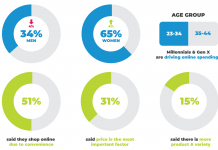VMLY&R South Africa’s Dono White, Strategic Lead, and Head of Data, Mike Pearse, measured the brand equity of over 90 local brands using the agency’s new Equity Edge tool. This report reveals their findings on which brands leveraged Black Friday to build on equity and popularity.
While many brands follow the crowd in joining the cultural trend, the question remains: is it actually worth the ‘deep’ discounting or is it detrimental to your brand equity?
The Black Friday question
It has become one of the most notorious retail days on the South African calendar, in spite of the event following the American concept of Thanksgiving. Since its introduction in 2012 servers have crashed, windows have smashed, cars have been double-parked and toilet paper packs have filled up shopping carts.
Reports by Payfast show online transactions increased by 50% YoY with the payment gateway reporting they experienced a 283% increase in total payment volumes. In a 2017 Nielsen SA research report on Business Insider, Nielsen ‘found several leading brands that did not participate in Black Friday promotions lost market share’ in the same year.
Following that logic, whether following the trend or being counterculture like REA’s famous #OptOutside, participating could increase or maintain market share. The question then was what does participating do to a brand’s equity?
Equity edge born and put to the test
Observing and capitalising on the many complications that Covid-19 brought to the world of qualitative research, VMLY&R South Africa quietly launched Equity Edge, a contemporary brand equity scoring system that leapfrogs and measures brands based on various digital data points. Inspired by the legacy and methodology of Y&R’s Brand Asset Valuator (BAV and BAV Social), the world’s leading empirical research of brands, Equity Edge acts as a lead indicator that complements lagging indicators of conventional qualitative brand studies.
Applying Equity Edge to Black Friday allowed the company to measure top brands that participated in the 2020 season. Using the ten‐point scoring system gives the ability to measure apples with apples and spot brand momentum and popularity shifts.
Brand impact assessments
Top South African retailers were measured using Equity Edge methodology in October 2020 to set the baseline, followed by data collection through the month of November 2020 – when Black Friday awareness campaigns started. The results were surprising.
Positive brand momentum gainers:
Brands who prioritised both the online and offline CX of their consumers won the differentiation race. This was coupled with single-minded messaging and integrated communications campaigns.
Notable brands who gained momentum:
1. Zando
#ZandoBlackFriday saw no conflicting messaging from the online retailer, driving a 31% increase in brand vitality month‐on‐month and a 13x increase in engagement with the likes of their single‐minded RT to win a R1000 voucher. Simplicity coupled with their needs‐based showcasing of products on sale made Zando one of the top brands on Black Friday.
2. Adidas
Adidas integrated their Black Friday campaign across social media and radio seamlessly. By leveraging YFM and KFM through a simple #3Stripes Wishlist campaign, they saw a 76% increase in brand vitality and interest spanning 6.7 million South Africans reached. The sneaker brand built on its credibility in culture, with the trendy Mandalorian shoes and Ivy Park coming out clear winners.
3. Makro
Makro understands its consumers and what value they get out of the media they provide. This was seen in their smart use of social automation and turning broadsheets into deal alerts in an unintrusive way. The added incentive of winning a Bosch hamper throughout #MakroBlackFridayExtended found the brand doubling their brand reach and gaining 22% brand vitality.
Positive brand popularity gainers
Who does not like the opportunity to win and win often? Brands who saw an exclusive movement in brand popularity experienced this because of the many promotional activities they ran throughout the month. The strategy here was to capture a share of voice and they did so, however often with too many different and sometimes competing campaigns.
Notable popular brands:
1. Game
Game is generally positioned on price, so the pressure is always on for this brand during Black Friday. Their overarching 28 Days of Black Friday came with many activities on and offline. Influencers and micro-influencers were used to drive 1c in-store surprise deals and extended operating hours. Added to this, the use of social automation software drove opt‐ins for deals and a chance to win vouchers. While net sentiment toward the brand increased 52%, no element of differentiation was added.
2. Superbalist
Again, while Superbalist captured the eye of the consumer (and possibly a very successful sales day), they ran a campaign with what seemed to be multiple mechanics to win R1500 vouchers to shop their Superbalist Spoilers. Consumers love many chances to win, but they do not love many mechanics. Superbalist drove app downloads and an online wishlist mechanic to win. The overall mood around the campaign increased 29%, making it a popular brand throughout the Black Friday month.
3. Samsung
A bonus advantage for Samsung came with the exposure through their Idols SA sponsorship both online and in broadcast, making them top of mind on a day when South Africans love to shop electronics. The slight shift in popularity came from a 23% month-on‐month mood shift owing to their multiple promotional messages that included #FeelTheSamsungDeals, Buy and Get Promo Deals, new weekly deals and the opportunity to win one of 50 Samsung fast charging battery packs.
Whose brand momentum and popularity got hurt?
In general, most grocery retailers seemed to have lost some brand momentum this year by engaging in Black Friday. Possible reasons for this include Covid‐19 making these essential dealers popular during lockdown, an increase in e-commerce (despite many having e-commerce stores) and South Africans looking for more spectacular deals in fashion and electronics.
Brands here saw large decreases in brand vitality and reach as they struggled in the overall clutter. Driving generic deals drove down Checkers’ month‐on‐month reach by almost half and left the brand with little relevance in comparison to competitions and exciting products beyond groceries.
Pick n Pay on the other hand drove a successful PR campaign to assure consumers of the learnings from panic buying extended hours and stock. Their deals, however, were also generic, and they focused on accumulating data for direct communications about deals. A lack of excitement from the category saw low consumer interest as a result.
Online eTailer Takealot joined the physical brick and mortar brands in the category of brand loss. The #BlueDotSale kept South Africans busy throughout November with similar tactics as those who won on the day. Offering vouchers, app downloads, online wish lists and RT to build mosaic mechanics should have at least made the brand popular right? Sadly, Takealot dropped 32% month‐on‐month on brand esteem measures due to continuous communication from consumers calling out the brand for inflating their prices or charging normal prices on Black Friday.
Black friday learnings
Africa is a fortunate continent that has skipped over many tech trends, often adopting devices and processes that are quicker, more convenient and cost-effective. While Equity Edge is not indicative of the actual business results and acts as a leading indicator in the shorter term, its benefit of being able to measure brands in the era of social distancing shows that how brands are measured needs to evolve and be different.
South African brands are doing little to differentiate themselves on big days such as Black Friday (and more recently an uptake with Singles Day on 11/11). While many saw positive gains (and this is most probably reflected in their market share and bank accounts), many used the same tactics that not only drive clutter but drive brand communications fatigue that runs the risk of consumers switching off.
Let us hope 2021 brings more exciting approaches to Black Friday by looking to create something closer to our local culture/s, whilst looking to drive innovation that captivates South Africans with campaigns that are more strategically driven and that drive a better customer experience in an integrated fashion using single-minded messaging and call to action mechanics that give brands a superior edge.
VMLY&R SOUTH AFRICA
+27115553800
www.vml.com/southafrica











